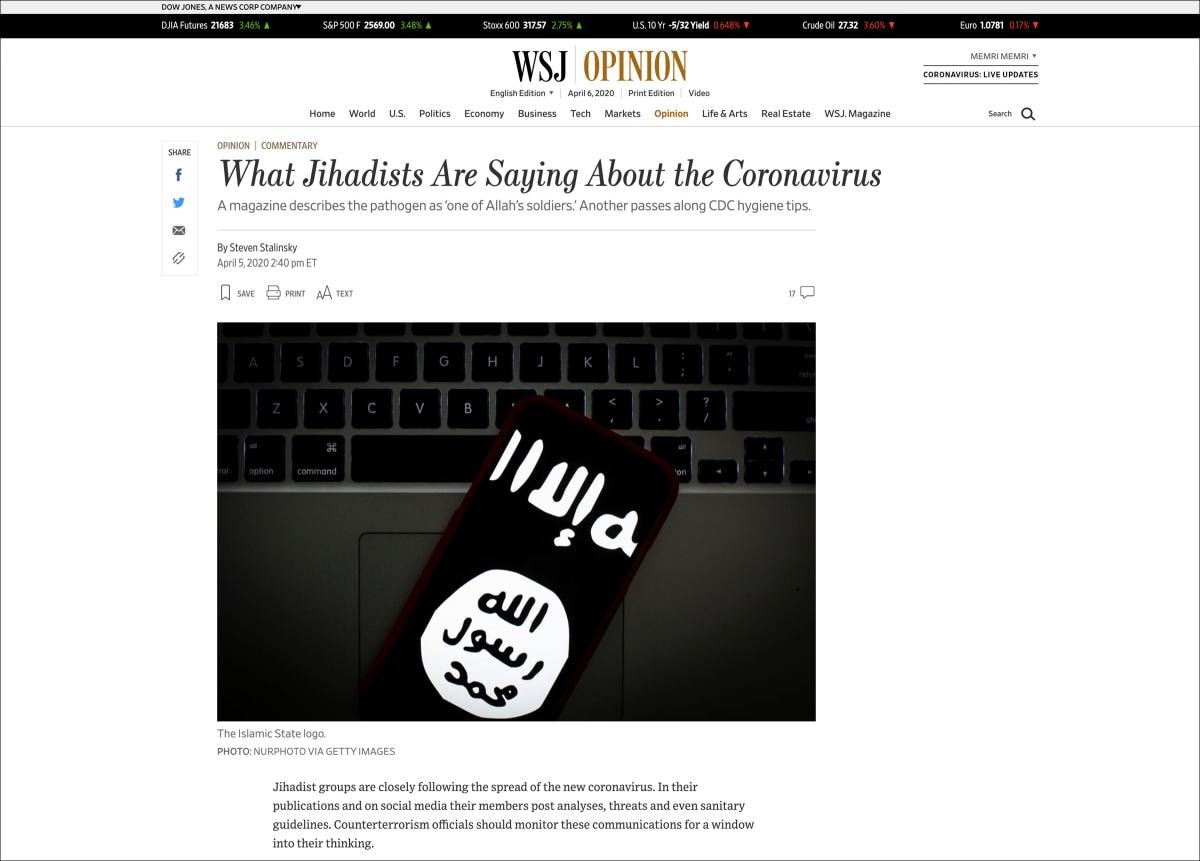
The following is an op-ed by MEMRI Executive Director Steven Stalinsky that was originally published in The Wall Street Journal on April 5, 2020.
Jihadist groups are closely following the spread of the new coronavirus. In their publications and on social media their members post analyses, threats and even sanitary guidelines. Counterterrorism officials should monitor these communications for a window into their thinking.

Jihadists and their supporters have been gloating over the health restrictions enacted across the world, especially in the U.S. "They used to mock women wearing the Islamic niqab – now they are doing the same. We ridicule you like you ridiculed us," reads a typical post, dated March 17, on the jihadist al Tawhid Awalan channel on Telegram, the encrypted messaging app. The statement accompanied a photo of Westerners in layers of protective clothing.
Many jihadists are cheering the virus on. Balagh, a monthly magazine published out of Idlib, Syria, by clerics with al Qaeda sympathies, calls the virus "one of Allah's soldiers": the "corona-soldier." This is a popular theme. Jihadist writer Khalid al Sibai warned on the Thabat news agency's Telegram channel that this "tiny soldier," which has so devastated the U.S. and its allies, could soon be joined by jihadist soldiers in the flesh – a threat. On Hamas's al Aqsa TV, Imam Jamil al Mutawa boasted that Allah "sent just one soldier," the virus, "and it has hit all 50 states" in America, driven Israel into lockdown, but left Palestinians mostly unaffected.
One of the most significant early statements was a Jan. 23 fatwa by the Syrian cleric Abdul Razzaq al Mahdi. He said Muslims are permitted to pray for the virus to annihilate the Chinese "enemies of Allah" for having "killed, slaughtered, imprisoned and oppressed the Uighurs," a Muslim ethnic minority in China's Xinjiang province. Islamic State concurred in its al Naba weekly magazine and also held up Iranian coronavirus deaths as a sign from Allah of the "blindness" and "insolence" of Shiite Muslims, who should "abandon polytheism."
Abu Muhammad al Maqdisi, the prominent Jordan-based sheikh and spiritual mentor of Abu Musab al-Zarqawi, the man who founded the al Qaeda offshoot that would later become ISIS, posted a series of messages on Telegram about the pandemic's "hidden benefits" for Muslim societies. These include the closing of bars and nightclubs, and that more women are covering their faces with niqabs to protect from the virus. Most recently he added, "There is nothing wrong with a Muslim praying for the deaths of infidels and wishing that they contract coronavirus."
Syrian jihadist commander Asif Abdul Rahman pointed out on his Telegram channel that Iran could use "alive or dead" coronavirus patients as a biological weapon – like the Mongols reportedly did in the 14th century, when they catapulted the bodies of plague victims into the city of Kaffa (now Feodosia, Ukraine). Iranian authorities, he added, could certainly persuade patients to die as martyrs.
This followed a threat by New York-based Muslim Brotherhood activist Bahgat Saber, in a video uploaded March 1 to his Facebook page, that if he became sick he would go to the Egyptian Consulate in New York to infect its staff as revenge against Egypt's government. He exhorted others to do likewise.
The coronavirus pandemic is also causing the global jihadist movement to focus on keeping the disease from spreading within its ranks. Wiping, sanitizing, taking temperatures and sharing health tips are a new part of jihadist daily life. The March 12 issue of al Naba, the ISIS weekly, included a colorful infographic of "shariah guidelines for dealing with the epidemic," advising hand-washing and even quarantines: "The healthy should not enter the land of the epidemic and the afflicted should not exit from it." On March 18 the al Qaeda affiliate Hayat Tahrir al Sham put out health guidelines that cite the recommendations of the U.S. Centers for Disease Control and Prevention. It seems America isn't all bad.
Many of the groups and people mentioned above have been involved in attacks on the U.S. and other Western countries. As the world fights Covid-19, the jihadists continue to look for vulnerabilities to exploit. In the March 19 issue of al Naba, ISIS warned that jihadists won't hesitate to take advantage of the chaos, and that the "financial losses of the Crusaders and tyrants" – Americans and their Arab allies – and "their preoccupation with protecting their countries from themselves and their other enemies" will contribute greatly to "weakening their capabilities to fight the mujahedeen." Let's disappoint them.
Mr. Stalinsky is executive director of the Middle East Media Research Institute.
Latest Posts



